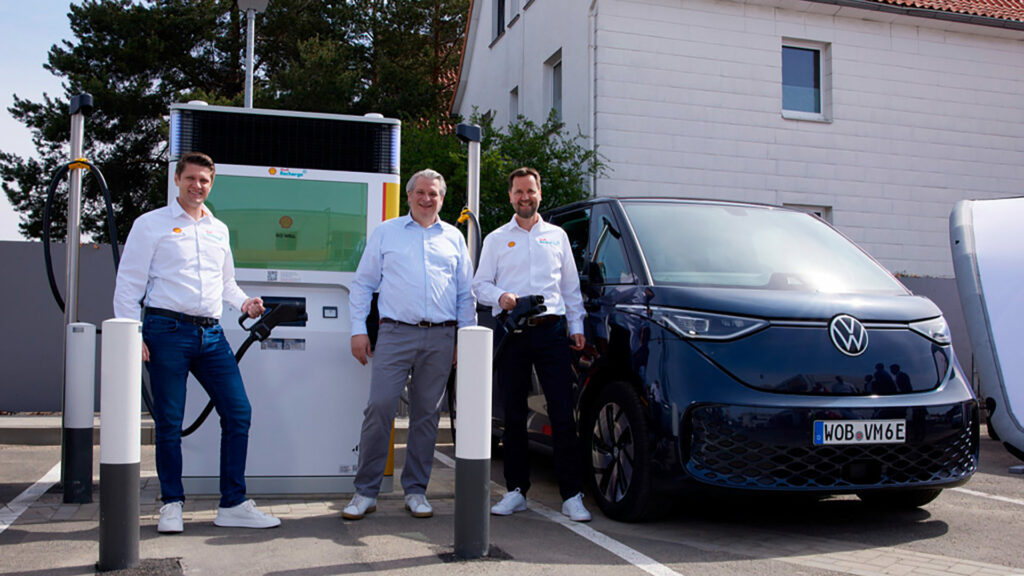Shell and Volkswagen have partnered to deploy the first 150 kW Elli Flexpole charging station in a Shell service station located in Göttingen, Germany. The new charging station, with its unique battery storage system, can connect to a low-voltage grid, which allows it to be installed with ease and flexibility, hence accelerating the expansion of the grid.
According to the Federal Network Agency, around 21,000 charging points were added last year, making a total of over 80,000 in Germany. However, the expansion of the charging infrastructure is slowed down due to the special transformers' long delivery times and 900 German distribution system operators' different requirements. The Elli Flexpole solution could overcome these challenges, as the chargers can be directly connected to the low-voltage grid, reducing installation time significantly. These Elli Flexpole chargers offer a charging speed of up to 150 kW, adding up to 90 miles to a battery within ten minutes.
Shell aims to become a company with net-zero CO2 emissions by 2050, and one of its strategies is to develop diverse infrastructure for electric vehicles. The company has taken steps in the past few years to achieve this goal. In 2017, it acquired NewMotion, then Europe's largest charging provider, which has since been renamed Shell Recharge Solutions. In 2019, the company started building Shell Recharge fast charging stations at Shell service stations, and in 2021, it acquired the Berlin-based start-up Ubitricity, which enables charging at lampposts on the street.
Recently, the company acquired SBRS GmbH, a leading provider of charging infrastructure solutions for commercial electric vehicles. In 2022, the company opened the first Shell Recharge fast charging stations at the parking lots of REWE and PENNY supermarkets. Shell has also partnered with IONITY, the joint venture of Audi, BMW, Daimler, Ford, Hyundai, Porsche, and Volkswagen, to set up fast-charging stations along motorways in European countries.
Tobias Bahnsen, the Head of Shell E-Mobility responsible for Germany, Austria, and Switzerland, said: “With VW's Elli Flexpole charging stations, we can make an important contribution to the necessary expansion of the charging infrastructure. And in locations where it would be otherwise difficult for fast charging. Shell is already one of the largest providers of charging infrastructure at home, at work, at on-street lamp posts, and at our service stations. We want to do our part to enable customers to switch to electric vehicles and reduce CO2 emissions in the transport sector.”
Simon Löffler, the Chief Commercial Officer at Elli, added: “The rapid expansion of the charging infrastructure is a prerequisite for the success of e-mobility. We contribute to this journey with our innovations such as the Elli Flexpole. It can be set up almost anywhere without major construction work, making it ideal for quickly setting up fast-charging options. We are pleased to have found a strong partner in Shell who, like us, wants to expand the charging network in Germany and across Europe.”
The German government aims to have at least one million charging points for electric cars by 2030. The expansion of the charging infrastructure is necessary to ramp up e-mobility. The Flexpole charging station from Volkswagen's Elli brand offers a significant breakthrough in overcoming the challenges of the infrastructure expansion. The low-voltage grid connection and battery storage system make the charging station easy to install and flexible in its placement. The collaboration between Shell and Volkswagen represents a significant stride towards achieving the German government's goal and promoting sustainable mobility. Shell has set an ambitious target of installing over 500,000 charging points worldwide by 2025 and 2,500,000 by 2030.
One thing is for sure in this market: The likelihood of all these divergent brands still being around in 2030 is unlikely. We're still seeing an expansion in the number of brands available to customers, but history tells us that a coalitions and mergers will soon reduce the available brands to just a handful in each country.
For now, if you are signed up on one of the aggregation networks like the one run by Octopus, it's good news.
